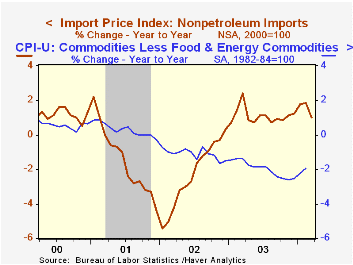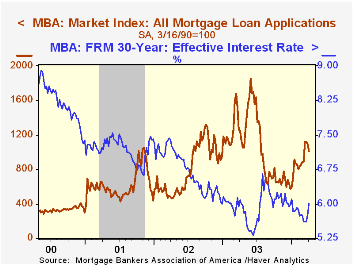 Global| Apr 07 2004
Global| Apr 07 2004Import Prices Up Twice Expectations
by:Tom Moeller
|in:Economy in Brief
Summary
Imported commodities prices jumped 0.9% in March, nearly double the Consensus expectation for a 0.5% rise. The surge was led by a 6.1% m/m jump in petroleum prices. In early April, the price of Brent Crude Oil is down 7.1% versus the [...]

Imported commodities prices jumped 0.9% in March, nearly double the Consensus expectation for a 0.5% rise.
The surge was led by a 6.1% m/m jump in petroleum prices. In early April, the price of Brent Crude Oil is down 7.1% versus the March average to $31.41/bbl.
Non-petroleum import prices rose a modest 0.2%. Since 1990 there has been a 35% correlation between the y/y change in non-petroleum import prices and the change in core US consumer goods prices.
Capital goods import prices were unchanged for the second consecutive month (-0.6% y/y) reflecting the continued decline in computer prices (-4.2% y/y). Non-auto consumer goods prices were unchanged, also for the second month (0.8% y/y). Apparel prices continued weak (-0.1% y/y). Auto prices rose a slight 0.1% for the second month (1.3% y/y) but industrial supplies & materials prices surged 3.3%. Less fuels these prices rose 2.5% (10.3% y/y).
Export prices jumped 0.9%, the largest one-month gain since April 1995. Agricultural export prices continued strong with a 3.3% gain (20.7% y/y). Nonagricultural export prices rose 0.6% (1.9% y/y). Capital goods export prices rose 0.3% (-0.2% y/y) and non-auto consumer goods prices were unchanged for the third consecutive month (0.5% y/y).
"Inflation Signals and Inflation Noise" from St. Louis Federal Reserve Bank President William Poole is available here.
| Import/Export Prices (NSA) | Mar | Feb | Y/Y | 2003 | 2002 | 2001 |
|---|---|---|---|---|---|---|
| Import - All Commodities | 0.9% | 0.4% | 1.2% | 2.9% | -2.5% | -3.5% |
| Petroleum | 6.1% | 0.1% | 1.9% | 21.0% | 3.0% | -17.2% |
| Non-petroleum | 0.2% | 0.4% | 1.0% | 1.1% | -2.4% | -1.5% |
| Export - All Commodities | 0.9% | 0.7% | 3.4% | 1.6% | -1.0% | -0.8% |
by Tom Moeller April 7, 2004

The index of mortgage applications compiled by the Mortgage Bankers Association dropped 7.2% last week, the third consecutive weekly decline.
The decline in the total applications index reflected a 15.0% w/w drop in mortgage refinancings (-33.0% y/y). Purchase applications jumped 7.6% (19.1% y/y) following a 1.1% decline the prior week.
During the last ten years there has been a 56% correlation between the y/y change in purchase applications and the change in new plus existing home sales.
The effective interest rate on a conventional 30-Year mortgage rose to 6.01% from 5.75% the prior week. The effective rate on a 15-year mortgage rose to 5.38%, about its highest level this year.
The Mortgage Bankers Association surveys between 20 to 35 of the top lenders in the U.S. housing industry to derive its refinance, purchase and market indexes. The weekly survey accounts for more than 40% of all applications processed each week by mortgage lenders. Visit the Mortgage Bankers Association site here.
| MBA Mortgage Applications (3/16/90=100) | 04/02/04 | 03/26/04 | 2003 | 2002 | 2001 |
|---|---|---|---|---|---|
| Total Market Index | 1,012.9 | 1,091.3 | 1,067.9 | 799.7 | 625.6 |
| Purchase | 477.5 | 443.8 | 395.1 | 354.7 | 304.9 |
| Refinancing | 4,126.7 | 4,857.6 | 4,981.8 | 3,388.0 | 2,491.0 |
Tom Moeller
AuthorMore in Author Profile »Prior to joining Haver Analytics in 2000, Mr. Moeller worked as the Economist at Chancellor Capital Management from 1985 to 1999. There, he developed comprehensive economic forecasts and interpreted economic data for equity and fixed income portfolio managers. Also at Chancellor, Mr. Moeller worked as an equity analyst and was responsible for researching and rating companies in the economically sensitive automobile and housing industries for investment in Chancellor’s equity portfolio. Prior to joining Chancellor, Mr. Moeller was an Economist at Citibank from 1979 to 1984. He also analyzed pricing behavior in the metals industry for the Council on Wage and Price Stability in Washington, D.C. In 1999, Mr. Moeller received the award for most accurate forecast from the Forecasters' Club of New York. From 1990 to 1992 he was President of the New York Association for Business Economists. Mr. Moeller earned an M.B.A. in Finance from Fordham University, where he graduated in 1987. He holds a Bachelor of Arts in Economics from George Washington University.
More Economy in Brief
 Global| Feb 05 2026
Global| Feb 05 2026Charts of the Week: Balanced Policy, Resilient Data and AI Narratives
by:Andrew Cates






